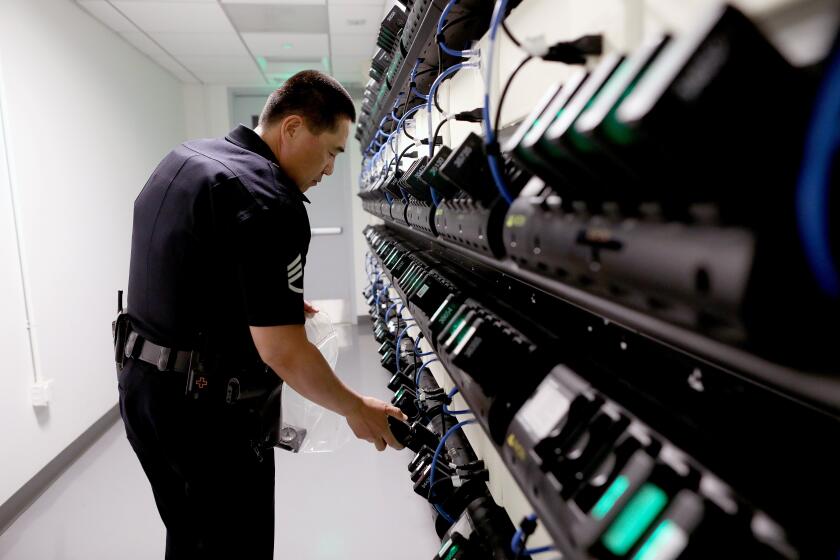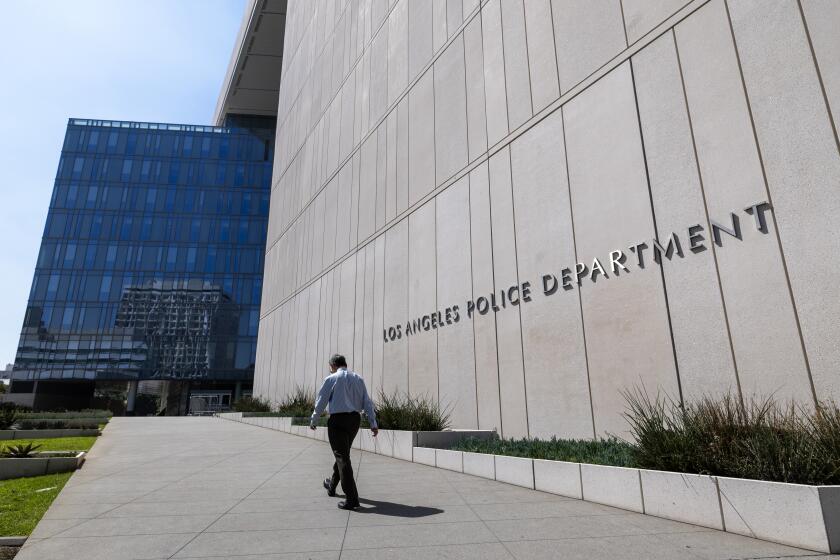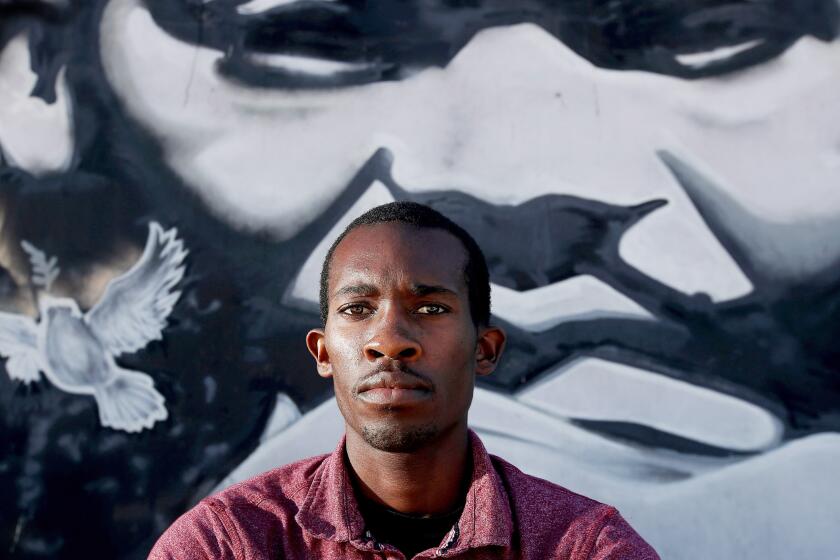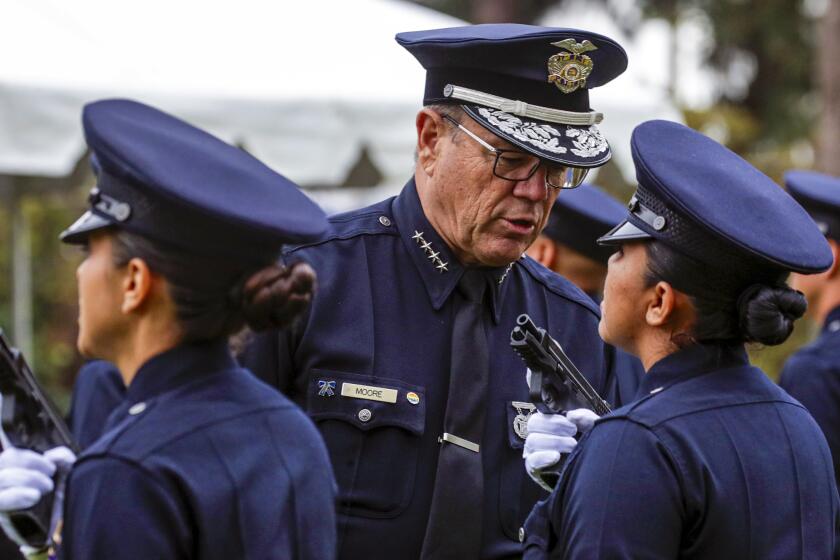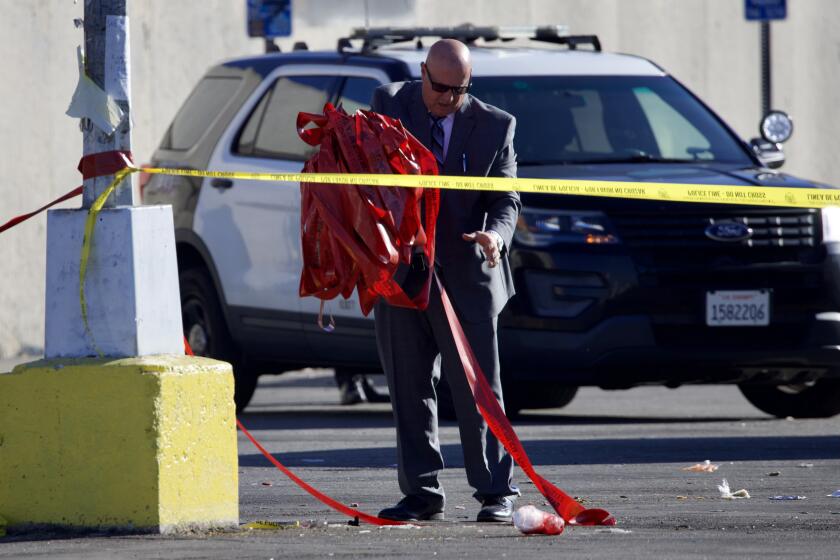‘Coolio-style hair’: LAPD union official’s column sparks backlash and debate
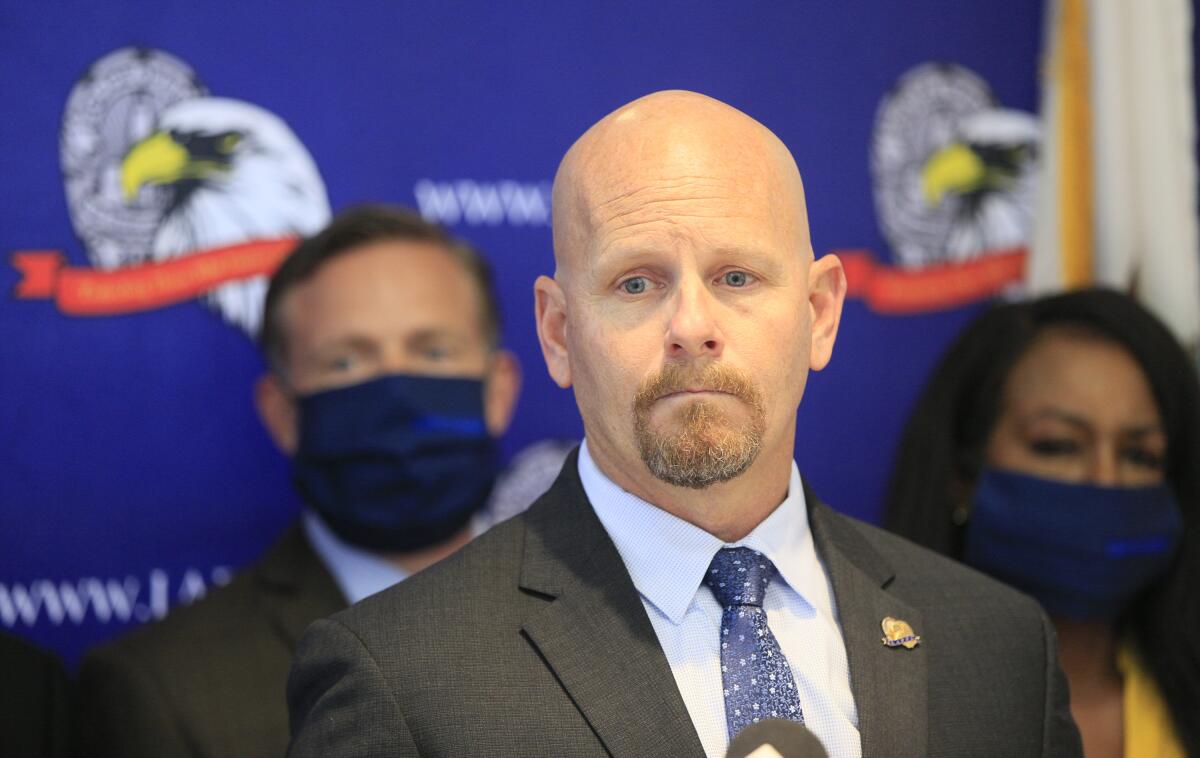
- Share via
Hours into a standoff with a barricaded suspect in northeast Los Angeles earlier this year, a Black officer said he was cornered by a white lieutenant who berated him for sporting a beard that was longer than permitted by LAPD regulations.
“This department is accepting anything now,” the lieutenant said, according to a complaint filed in the case. The officer who reported the incident declined to comment and asked that his name be withheld, citing fear of retaliation within the department.
The officer explained in his complaint that he had been granted a medical exemption to grow facial hair, but the lieutenant’s rant continued until another supervisor stepped in. The officer said the April 23 episode was humiliating and left him feeling no longer “included or accepted in the LAPD.”
Shaving is painful, the officer said. He was diagnosed with pseudofolliculitis barbae, or PFB, a skin condition that disproportionately affects Black men, causing blemishes and acne-like bumps that can scar or bleed.
In the wake of a gang unit scandal and concerns about officers misconduct, LAPD leaders are considering whether to use artificial intelligence to analyze vast troves of officer body-cam footage.
The incident touched a nerve among some Black officers on the force, who described their own brushes with racial discrimination because of beards or the way they styled their hair. Some of those concerns resurfaced last month after a high-ranking police union official wrote a column accusing the department of lowering its standards on beards and allowing officers to have “Coolio-style hair,” referring to the late rapper who sported trademark twists.
Jamie McBride, a board member of the Los Angeles Police Protective League, wrote that while making the rounds at police stations around the city during recent contract negotiations, he noticed numerous officers with beards or the “craziest hairstyles” that didn’t adhere to the department’s on-duty grooming standards.
One officer “looked like he was going to a Bob Marley concert,” with long braids “running down past his collar and then folded up,” McBride wrote.
The officer needed a “female hairband to keep his hair out of his face,” he wrote. McBride also noted the presence of a female captain whose hair sits “high on top of her head it looks more like a hat in search of a propeller,” in such a way that she couldn’t properly wear a department-issued hat.
The captain attends recruit graduation ceremonies and other department functions, McBride wrote, “so it is clear that Chief Moore and the entire command staff are well aware of this.”
“Wearing a beard while in uniform looks shoddy and unprofessional, and it is disrespectful of every LAPD officer who has and still does wear this uniform,” McBride wrote. He noted that some officers have medical or religious exemptions that allow beards, but said: “To be honest, I’m not buying it.”
For months, someone has been filing anonymous complaints against members of the LAPD command staff under the pseudonym “Mel Smith.”
“Sometimes when I shaved, the wool uniform would irritate my skin and cause ingrown hairs or a rash,” he wrote. “However, I would be too embarrassed to request a medical exemption because beards look like crap in uniform.”
McBride suggested that officers with beards may not be able to carry out certain tasks essential to the job, such as properly donning a gas mask. Those with sensitive skin, he wrote, should “perhaps buy a better razor.”
The piece was titled “Don’t Crown Me,” a reference to the CROWN Act, federal legislation proposed last year to outlaw racial discrimination based on hairstyle.
For the record:
2:44 p.m. Dec. 11, 2023An earlier version of this article said the CROWN Act was a federal law passed last year. The proposal was a House bill that was not signed into law.
The House bill was modeled after California legislation enacted in 2019 that made the state the first in the nation to prohibit the enforcement of grooming policies that disproportionately affect people of color, particularly Black people. This included bans on hairstyles such as Afros, braids, twists, cornrows or dreadlocks — or locs for short.
McBride claimed some officers are abusing the policy, but department brass has been “too scared to do anything about it.
“Just the typical selective enforcement, I suppose,” he wrote in the column, which appeared in the November issue of the union’s Thin Blue Line magazine.
Bernard Robins, who was detained outside his parents’ South L.A. home by fellow LAPD officers, said the episode typifies the style of biased policing that’s practiced in some parts of the city.
In interviews with The Times, numerous Black officers said they felt targeted by what they saw as dog-whistle language in McBride’s column about “Coolio” hairstyles. Some said that while the LAPD has a policy against hair discrimination, they still felt the scorn of fellow officers through dirty looks and comments. A few were told their appearance would prevent them from being promoted.
Those with PFB talked of facing the dilemma of having to choose between their health and shaving their beards to appease colleagues and higher-ups in an organization where conformity is deemed a necessity.
Others questioned his choice of language, but agreed with McBride’s argument for the importance of keeping up appearances. The officers only agreed to speak with The Times on the condition of anonymity, because they feared retaliation from the police union.
The Oscar Joel Bryant Assn., which represents the department’s Black officers, said the union leader’s words were divisive.
A string of recent controversies have put to a test LAPD Chief Michel Moore’s quest to get his department into shape before stepping down in the next year or two.
“Fomenting divisiveness is easy; it is far harder to recognize the need for change and lead others in that direction,” the association’s president, Capt. Shannon Enox-White, said in the statement. “The Department continues to educate leadership at all levels on the law and how it impacts the communities we serve.”
Like other law enforcement agencies around the country, the LAPD has in recent years loosened its standards on cops’ hair, tattoos and other body art. In some ways, McBride’s commentary tapped into resentment inside the LAPD over what some see as the erosion of the professional, spit-and-polish image of the department dating back to the days of Chief William J. Parker, who was a stickler for grooming.
Even as the department has become more diverse, the traditional look of a city cop — ironed LAPD blue uniforms, shined shoes and neat haircuts — has remained largely unchanged for decades.
LAPD Chief Michel Moore said that while he only skimmed McBride’s column, it was clear from what he read that the union leader’s views were “out of step” with changing social norms.
The allegations echo claims made last month by a veteran LAPD detective who said he was sexually assaulted amid a group of 30 to 40 police officers during a locker room hazing ritual for rookies on the department’s amateur football team.
“I would ask that Jamie reflect upon the evolution of our societal standards and that he evolve as well,” Moore said in an interview.
He also pointed to what he saw as the hypocrisy of McBride talking about officers’ appearances, when the union leader proudly displays sleeve tattoos off duty and has been known to sport a goatee in the past.
“I find it interesting that he would throw rocks at others,” the chief said, noting that since McBride doesn’t regularly wear a uniform or appear in court, he doesn’t have to adhere to the same standards as other officers. Moore said he also “supports his criticism when officers don’t follow our requirements.”
But, the chief added: “I think his criticisms go beyond that. I think his criticisms went to disagree with the CROWN Act provisions, and that is where I think he’s out of step.”
McBride told The Times that his column had everything to do with upholding a certain standard of appearance, not race. He said he had received nothing but positive feedback, including from “active command staff [who] said that they agree with me but they can’t say anything because of their position.”
“This isn’t picking on any one group, white, Black and Latino officers with beards,” he said. “We’re LAPD: We’re supposed to look sharp, we’re supposed to look processional.”
Moore recently updated the department’s policy on tattoos. Officers must now cover up body ink on their arms, hands, legs, neck and behind their ears. Under an administrative order, dated Nov. 29, all facial tattoos are banned, with the exception of “permanent make-up” such as eyeliner, lipliner and eyebrows that are tattooed on someone’s face. Officers with larger tattoos on their arms are required to wear long-sleeved uniforms, except those in undercover assignments.
The department offers exemptions for officers with beards from certain faith groups, such as Sikhs, whose religion expects devout members to maintain unshorn hair and beards.
In recent years, several legal challenges have arisen against grooming standards seen as arbitrary and discriminatory. Last December, a federal appeals court granted a preliminary injunction allowing two Sikh men to immediately begin basic training with the U.S. Marine Corps without shaving their beards. The men had argued the Marines’ grooming policy violated their right to freedom of religion.
A series of high-profile incidents in recent years have thrust the politics of hair into the national conversation about race. In Alabama, a Black woman was fired for not straightening her hair. Gabby Douglas, the first Black woman to win the Olympic all-around gymnastics title, faced criticism early in her career for not pulling her hair into a ponytail, and a young Black wrestler was asked to cut his locs or face disqualification before a match.
While more organizations have loosened their grooming standards in recent years, many rules on workplace appearance are “based on a Eurocentric standard of beauty,” said Gail A. Dawson, a business professor at the University of Tennessee-Chattanooga. Dawson said such policies are part of the dehumanizing legacy of chattel slavery, in which people with darker skin and kinkier hair were never allowed to work indoors.
LAPD statistics show that violent crime — including homicides, rapes, robberies and shootings — is down this year, but there’s a lingering sense that the city is getting less safe.
Dawson, whose sister is a police officer in Philadelphia, acknowledged that some rules for law enforcement are based on safety; for instance, an officer’s overly long hair can turn into a liability during a struggle, she said. But other grooming standards are unrelated to job performance and place an especially unfair burden on Black women, in particular, who have to follow elaborate routines to tend to their curls, or turn to relaxers, weaves or wigs that are expensive and can damage their hair, she said.
Yoseph Dalia, a dermatology instructor at Harvard Medical School, said that despite the CROWN Act and other state laws, some of his patients of color tell him they feel stigmatized in their workplaces because of their hairstyle. Others report having their abilities being called into question.
“What’s considered professional? Why is someone’s hairstyle considered professional or not professional and if we’re gonna talk about acceptance of people?” said Dalia, who has written about PFB. In law enforcement, police officers and recruits face pressure to alter their appearance, which is part of their identity, in order to fit in, he said.
“So not only can they not get a gun, or keep a job or excel at, but they also have to deal with these kind of financial … to try to get in,” he said. “It’s kind of hypocritical to say and we love our law enforcement or we love our military, but then also make it hard for them to serve.”
More to Read
Sign up for Essential California
The most important California stories and recommendations in your inbox every morning.
You may occasionally receive promotional content from the Los Angeles Times.
